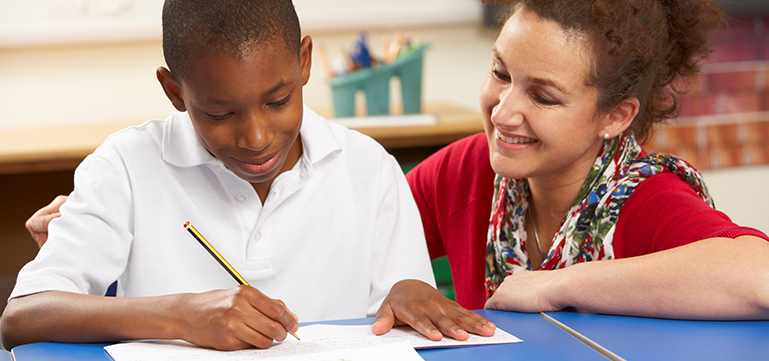Developing strong personal values at school

Information about the school
Coed Eva Primary School is in Cwmbran in the Torfaen local authority. Since September 2016, the school and Blenheim Road Community Primary School have formed the Federation of Blenheim Road Community and Coed Eva Primary Schools. Both schools share the same executive headteacher and governing body.
There are 488 pupils on roll, including 79 nursery pupils who attend the school part-time. There are 16 classes, including three mixed-age classes and one class for pupils with additional learning needs.
About 20% of pupils are eligible for free school meals, which is similar to the Wales average. The school has identified around 12% of its pupils with additional learning needs. This is lower than the Wales average. Most pupils are of white British ethnicity and a very few pupils have English as an additional language. A very few pupils speak Welsh at home.
The headteacher has been in post since 2009. She became executive headteacher of both schools in the federation in September 2016.
Context and background to the effective or innovative practice
The school is a caring environment where staff encourage pupils to develop strong personal values, such as tolerance, fairness and respect. The wellbeing of all pupils is central to the school’s ethos and this ensures that the school is a happy community where pupils can thrive and learn well.
An outstanding feature of the school is the wide range of responsibilities that pupils undertake and the very positive impact these have on standards of behaviour, the quality of provision, and pupils’ wellbeing and learning.
The school provides extensive opportunities for pupils to enhance their leadership skills through involvement in a wide range of pupil voice groups. Teachers ensure that pupils of all ages and abilities have the opportunity to take part in these groups.
The pupil participation groups (PPG) all contribute effectively to improving teaching and learning through, policy writing and monitoring in the form of, learning walks, lesson observations and book scrutiny’s. Other initiatives include pupil voice linked to planning and pupils generating the success criteria in lessons.
Description of nature of strategy or activity
Pupils of all ages and abilities belong to the wide range of pupil leadership groups. These include the: Pupil Leadership Team (PLT), Eco Committee, Action Research Team, Editorial Team, Criw Cymraeg, Digital Leaders and the School Council. The Ellitee Committee is made up of a representative from each PPG group. These pupils are responsible for feeding back to SLT and governors the outcomes of the monitoring undertaken in their key areas. This level of ownership provides each group with the status to drive forward change.
The PLT works particularly effectively alongside staff and governors to observe lessons, undertake book scrutinises and learning walks to provide feedback to pupils and teachers to improve the quality of teaching and learning. Representatives from the pupil groups in both schools in the federation meet regularly to discuss their findings. Their findings directly impact the schools self-evaluation process.
The pupils’ Action Research Team acts as the voice for all pupils throughout the school. The team is in charge of listening to their view of their peers linked to a specific element of the school improvement plan or a specific line of enquiry that has derived from action research or from the pupil’s whole school questionnaire.
Teachers provide pupils with good opportunities to have a say in what and how they learn. For example, they involve pupils in planning tasks and activities for topic work. This motivates and engages learners in their topic and learning journey. Nearly all staff involve pupils in generating success criteria for activities. This helps pupils to evaluate what they do well and what they need to do to improve.
What impact has this work had on provision and learners’ standards?
Pupils contribute effectively to the federation’s self-evaluation processes. As a result, pupils impact positively on standards, behaviour, quality of provision and pupils’ wellbeing and attitudes to learning.
As a result of these leadership roles, a significant number of pupils develop highly effective leadership and life skills. They are proud of the very strong impact that their work has on the whole school community.
Pupil voice linked to planning ensures nearly all pupils are very well motivated and engage highly effectively with their learning. Nearly all pupils are active participants within lessons, which, allows them to be reflective and understand what they need to do to continually improve.
How have you shared your good practice?
There is considerable school-to-school working within the cluster, school improvement group and across the consortia. This has been shared in the form of Lead Network Schools (LNS) and via numerous bespoke partnerships.
Useful links
Other resources from this provider

Creating strategies to develop pupils’ independence

Literacy and the Foundation Phase - September 2011
pdf, 751.18 KB Added 01/09/2011